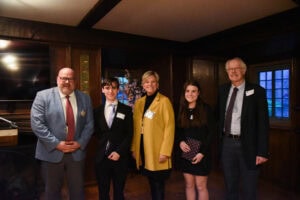May 02, 2023
KO Students Win Top Prize in WALKS Constitutional Essay Contest
Emma Barringer ’24 was recently selected as the WALKS Constitutional Essay Contest winner for 2023, and Sam Auclair placed second runner-up. This is the second year in a row that KO took home the coveted award, a testament to KO’s strong writing program that develops a student’s critical thinking and deep analysis of issues. It also reflects the overall strength of KO’s history department and the great work Upper School history teacher Rob Kyff does with his students daily.
WALKS is a consortium of five Hartford-area independent schools comprised of Westminster, Avon Old Farms, Loomis Chaffee, Kingswood Oxford, and Suffield Academy. Their Constitutional essay has been an annual event for over 60 years. Each year, the member schools select two essay writers from their junior history classes to submit to the overall contest under a selected topic. This year students researched and wrote on the topic of gerrymandering.
Essays are read and voted on by an external judge selected by the host school on a rotating basis. This year the judge was appellate court judge Ingrid Moll.
Barringer took Steph Sperber’s civics elective We the People this past fall, a contributing factor to her success since one area of the class discussed gerrymandering. Barringer researched which power can decide upon gerrymandering – the courts or the legislature. “This was a challenging, hard topic,” she said, “because everyone has varying opinions if the courts should decide to gerrymander. It’s a question of the separation of powers. Some people think that only the legislative branch can decide if gerrymandering is allowed and that the judicial court shouldn’t involve itself in the political process.”
“Currently, the position is that federal courts can’t really do anything against it, but state courts can still rule for partisan gerrymandering,” Auclair said. “ It’s very difficult to make a case that gerrymandering is positive. It would be saying that people’s votes don’t matter. It’s an attempt for political parties to gain more power.”
Barringer’s topic dove into many court cases, specifically Baker v Carr, a 1962 case before the Supreme Court. Baker contested that the lines of the state of Tennessee hadn’t been changed in 100 years, whereas it should change every ten years to coincide with the census. She said that Mr. Kyff helped consider where the Consitution could mention gerrymandering, even if it is not explicitly stated. “My Kyff was very supportive,” she said. “We talked about different clauses in the Constitution that apply, like the equal protection clause and the First Amendment.” One recent topic she discussed in her essay was the gerrymandering clause passed in New York State, where gerrymandering would no longer be possible. Two years after that law was passed, the highest court in NY found that gerrymandering still existed. “That was a big point in my essay,” she said. “Even if we try to solve it, there’s always going to be something that disrupts that process.”
Mr. Kyff guided his AP History Class with feedback through the essay assignment. Auclair broke the writing up over a long period but was waylaid with an illness before his rough draft was due. “My rough draft was a little lacking, but I made up for it in the final draft,” he said. “The week before it was due, I ate spaghetti at 10:00 p.m. to power through it.” He noted that Mr. Kyff’s commentary and comments were essential, and he made his ideas more precise and more concise. Barringer felt the writing process was easy for her being on the KO News, used to writing lengthy articles under a deadline. “I knew what was expected of me, so I could just sit and do it.”
